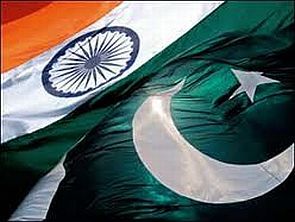 Pakistan tonight said it was "deeply disappointed" at India putting forth "pre-conditions" for National Security Advisors-level talks, accusing it of going back on the decision mutually agreed at the highest level by coming up with "frivolous pretexts".
Pakistan tonight said it was "deeply disappointed" at India putting forth "pre-conditions" for National Security Advisors-level talks, accusing it of going back on the decision mutually agreed at the highest level by coming up with "frivolous pretexts".
On a day of of intense sparring, Pakistan Foreign Office spokesperson said, "We are deeply disappointed at the statement of the spokesperson of India’s ministry of external affairs, putting forth pre-conditions for official talks to take place with Pakistan at the level of the NSA.
Drawing a redline, India had earlier made it clear to Pakistan that a meeting between Kashmiri separatists and Pakistan National Security Adviser Sartaj Aziz during his visit Islamabad was not appropriate. Aziz is due to meet them on Monday morning.
Pakistan reacted strongly to insist that it would not depart from the "established past practice" of interacting with separatist Hurriyat leaders, rejecting India's advice not to go ahead with their meeting with Aziz.
In the late night statement, the Pakistan foreign office spokesman said, "These talks, which were scheduled to take place on 23 and 24 August, flowed from a decision taken by the two prime ministers on July 10, in the Russian city of Ufa."
"This is the second time that India has chosen to go back on a decision mutually agreed upon between the two prime ministers, to engage in a comprehensive dialogue, by coming up with frivolous pretexts," he said
Tension between the two countries has increased alarmingly as a result of frequent violations on the Line of Control and Working Boundary, in the past months.
"The need of the hour was for the two countries to engage in sincere and serious dialogue to immediately reduce tensions and to undertake the task of normalization of relations, with sincerity and seriousness," he said.
The spokesman said Pakistan High Commissioner to India Abdul Basit's invitation to the Kashmiri Hurriyat leadership to a reception in honour of Aziz on 23 August, was "very much in keeping with the practice and tradition of the past many years."
Pakistan sees no reason to depart from this established practice, he said, adding, "After all, the Kashmiri Hurriyat leaders are genuine stakeholders in efforts to find a lasting solution of the Kashmir dispute."
"For India to refuse to engage in talks with Pakistan on this pretext, is a repeat of what it did when it cancelled the Foreign Secretary level talks that were scheduled to be held on 25 August last year, pursuant to the meeting between the two prime ministers in Delhi in May 2014," he said.
The spokesman said for the NSA talks in Delhi, Pakistan had proposed a comprehensive agenda, consistent with the decisions taken by Prime Minister Narendra Modi and Nawaz Sharif in Ufa, which included discussion on all outstanding issues, including Kashmir, as well as terrorism related matters, and other issues such as religious tourism, release of fishermen and peace and tranquility on the LoC.
"However, regrettably, the Indian side’s desire to restrict the agenda to terrorism-related issues only, amounts to a negation of the decisions taken by the two prime ministers," he said.
Rejecting India's contention that Pakistan was shifting its goalposts and introducing new conditions for talks, he said, "It is not Pakistan that has placed any condition for the talks.
"In fact, Pakistan has always demonstrated its belief in the dialogue process and is prepared to engage in meaningful talks with India, to resolve all outstanding issues that have bedeviled relations between the two countries, for the past many decades," he said.
Pakistan does not disregard agreements or understandings, he said while squarely holding the Indian side responsible for having "reneged on commitments agreed upon between the two Heads of Government in the past year."
"Pakistan wishes to reiterate its abiding commitment to promoting a relationship of cordiality and cooperation with all its neighbours, including India, in pursuance of the prime minister’s vision of a peaceful neighbourhood," he said.






 © 2025 Rediff.com -
© 2025 Rediff.com -